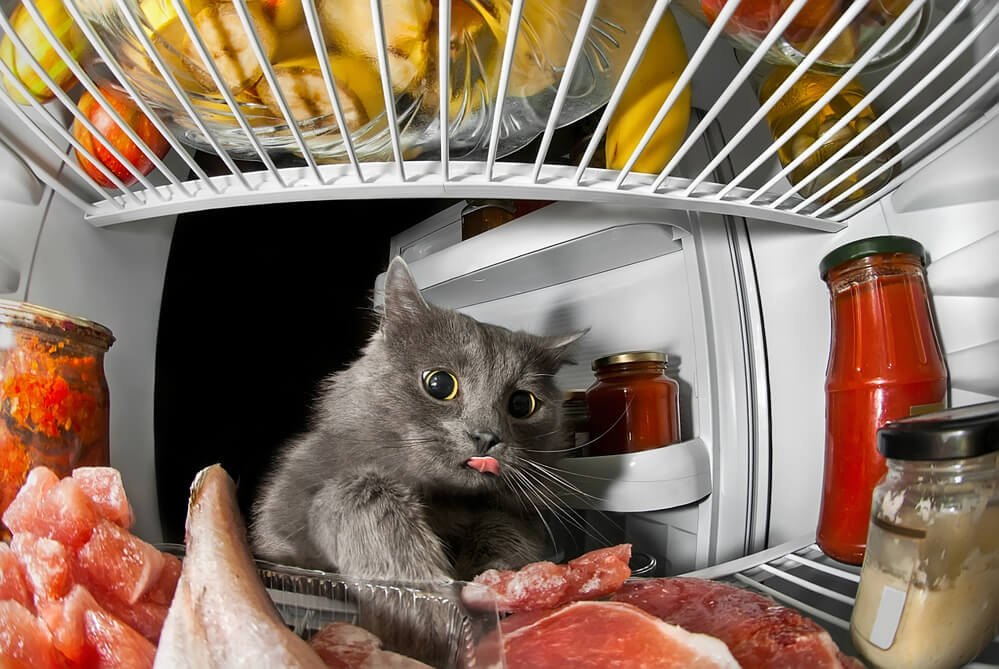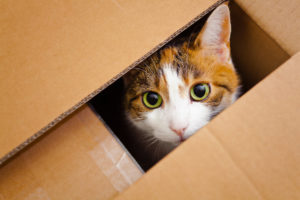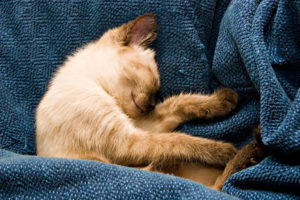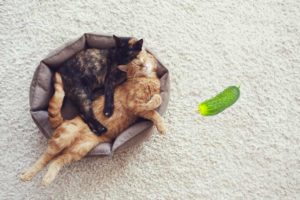Cats are obligate carnivores. This means that cats must eat meat to get the nutrients they need. What fruits can cats eat, then? The answer is none of them. Cats cannot digest fruit due to their digestive system being designed for receiving nutrients from meat sources rather than plant sources. Vegetables and grains can also cause issues with cats’ digestive systems because cats cannot digest them. Despite the misconception that all animals should be able to eat certain foods, if a cat eats something, it can’t digest or break down, like fruit or vegetables, this could make them sick.
Here is a list of some common fruits and their carbohydrate, protein, and fat content, so cats can eat:
Apple (with the skin) – 12.5g carbohydrates, 0.38g protein, 0.11g fat
Watermelon – 11.1g carbohydrates, 0.82g protein, 0.19g fat
Grapes – 15.9g carbohydrates, 1.3g protein, 0.37g fat
Banana – 23.8g carbohydrates, 1.01g protein, 0.34g fat
Tomato – 2.92g carbohydrates, 0.23g protein, 0.12g fat
Peach – 9.24g carbohydrates, 0.45g protein, 0.15g fat
Pear – 15.4g carbohydrates, 0.5g protein, 0.33g fat
Cherries – 10.6g carbohydrates, 0.45g protein, 0.17g fat
Kiwi Fruit – 17.3g carbohydrates, 1.1 protein, 0.23 fat
Mango – 23.4 carbohydrate, 1.2g protein, 0.55g fat
Figs (Dried) – 31 carbohydrate grams, 2g protein, 0.4g fat
Pineapple – 18.2g carbohydrates, 0.65g protein, 0.3g fat
As you can see, even the healthiest fruits are not recommended for cats. As well as fruit, vegetables are also not recommended for cats to eat. Cats should only be eating meat to get the nutrients they need-plants just don’t cut it!
What foods are toxic to cats?
Cats are extremely sensitive to some foods that are safe for humans. Owners need to be aware of this toxic foods-they can kill cats if eaten!
Onions, Garlic & Related Root Vegetables – Onions contain enough disulfides to cause Heinz-body anemia in susceptible individuals if fed in quantity. Garlic is considered about five times as potent; a single clove of garlic fed occasionally will not harm your cat, but the ingestion of several cloves or capsules could cause problems. Cats can also develop vomiting and diarrhea if they eat enough onions or related root vegetables due to fructan content (fructans are found in many plants but are especially concentrated in onion roots, which is why they’re known to affect cats).
Beans & Peas – Raw or dried beans & peas contain high cyanogenic glycosides, which break down into cyanide. The cat’s gastrointestinal tract does not produce the necessary enzymes needed to detoxify cyanide. Feeding moderate to large amounts of raw or dried beans has been reported to cause severe cyanide poisoning in cats. In addition, baked beans and canned pork & beans have been known to cause mild to severe cases of pancreatitis (inflammation) in both dogs and cats due to the high levels of fiber from the beans and the large amounts of fat contained in baked beans.
Fish & Shellfish – Raw fish and raw shellfish contain an enzyme called thiaminase, which destroys Thiamine (Vitamin B1). When this happens, the cat can go blind or die. Feeding a catfish as its sole diet for a long period of time will almost certainly lead to blindness and severe neurological problems. Thiaminase is destroyed by cooking, so commercial pet food manufacturers cook their products to ensure that the thiaminase enzyme is no longer present in the finished product.
Tomatoes – Tomatoes cause severe diarrhea and vomiting in most cats when fed in any quantity at all. This questionably safe fruit contains a toxin known as “Tomatine.” Cooking destroys most of the Tomatine, but not all.
Chocolate – Chocolate is considered toxic to cats, at least when fed in large quantities or when frequently fed in small amounts. The problem is that a cat’s metabolism cannot tolerate the stimulant effects of a chemical called theobromine found in chocolate. Theobromine is related to caffeine and is also found in tea, cola drinks, and other foods humans eat. Your cat can get very sick from eating just one ounce of milk chocolate! Call your veterinarian or the Animal Poison Control Center if you suspect that your cat has gotten into chocolate candy or any other food that you think might be harmful. Their number is 1-888-426-4435.
Caffeine – Many people are unaware of just how much caffeine is in many beverages and foods. Caffeine can cause heart problems, seizures, death in cats. Coffee, tea, sodas (even diet), chocolate, cocoa, some diet aids, and many other products contain caffeine that could be extremely dangerous to your cat.
Alcohol – Ingestion of alcohol can cause severe fatty liver disease in cats, always fatal if left untreated. Even licking a small amount of rum, whiskey, or other liquor from the mouth of someone who has been drinking could make your cat very sick.
Dairy products – Most adult cats are lactose intolerant, so feeding your cat milk or other dairy products can result in diarrhea or another stomach upset. Cheese is high in fat and protein, which won’t do your cat any good at all, but it may be enticing enough to cause an overweight cat to eat it.
What is the best homemade food for cats?
A homemade diet can be incredibly good for your cat. Generally, though, it’s best if you stick to canned food that contains both water and broth (to make sure your kitty gets all the necessary nutrients). However, some cats do better on dry foods, so you may need to experiment with different types to determine which one your cat likes best. Discuss the matter with your veterinarian, and he or she may have some recipes that you could follow.
Cats cannot eat fruits because they are not able to digest them. Although there are some exceptions like apples and blueberries, most fruit should be avoided due to the high amount of sugar content in it. Some other fruits like peaches, plums, and cherries contain a chemical called amygdalin which releases cyanide in the cats’ bowels. Sometimes, it’s okay to feed your cat small amounts of fruit (like what is used as toppings on some kitty foods) but avoid giving them any additional sugar-sweetened treats.
The best way to keep your cat healthy is to feed them high-protein, low-carbohydrate foods like meat. The cat’s natural diet consists mostly of protein, so feeding them food that is similar to their ancestors’ tastes best. Some dry foods even have a low carbohydrate content, but avoid giving your cats any treats that are filled with sugar or syrup because this can cause dangerous illnesses in the feline species.
Some of the healthy treat cats can eat:
-Cheese (Parmesan, cheddar, or cream cheese)
-Cottage cheese
-Eggs (cooked at low temperatures to reduce risk of salmonella poisoning)
There are some fruits that cats can eat in small amounts without suffering ill effects. These include blueberries, apples, and bananas. If you do feed your pet fruit, make sure that there are no harmful chemicals on the skin of the fruit before you serve it.
The effects of caffeine on cats can be fatal. If you suspect that your cat has had any food or drinks with caffeine in them, contact a veterinarian immediately. Cats who ingest caffeine will suffer from restlessness, excitement, muscle twitches, or even death. This is why it’s important to keep all food, especially candy and beverages that contain caffeine, out of reach of your cat.
Alcohol can cause severe liver damage in cats. If you suspect that your pet has had any amount of alcohol, try to induce vomiting by using syrup of ipecac (check with a poison control center first). Then take your cat to a veterinarian for treatment.
Because dairy products can cause vomiting and diarrhea in cats, it’s best to avoid feeding them any products that contain milk or cream. The fat content of cheese is also not good for your pet. However, some cats seem to be able to digest mozzarella and other low-fat varieties of cheese without any problems.
Many cats love meat and protein, so it’s best to give them a homemade diet that consists mostly of these items. You may find that your kitty enjoys his daily meal even more, when you mix in some tuna or cooked chicken with the cat food.
Some of the pet’s health relies on the foods that the pet eats. Cats can eat fruit but in small amounts. Because of the high amount of sugar content in it, most fruits should be avoided. However, there are some exceptions like apples and blueberries, which cats can eat in a small amount without suffering ill effects.
The best way to keep your cat healthy is to feed them high-protein, low carbohydrate foods like meat. They are carnivores, so their natural diet consists mostly of protein. Dry food is best for the cat’s health because it has a low carbohydrate content. Cats should not be fed any treats with syrup or sugar because this can cause dangerous illnesses in the feline species.
Some of the unknown treats you need to know are for choking hazards. It is important to call poison control for help. Alcohol can cause severe liver damage in cats, and caffeine can also be fatal. Dairy products in large amounts can cause vomiting and diarrhea in your kitty, so it is best not to feed them any products that contain milk or cream in large amounts.
Some of the treats you should avoid feeding your cat include any type of caffeinated beverages, alcoholic treats, and chocolate. If you suspect that your pet has ingested anything with caffeine in it, contact the poison control center immediately.
Green tomatoes, rhubarb, and chocolate can also be dangerous. This is why it’s important to keep all food away from the reach of your cat.
Some cats love meat and protein as their diet consists mostly of these products as a carnivore. With some cooked chicken or tuna mixed in with the cat food, many cats will even come for seconds.
If you want to keep your cat healthy, feeding them high-protein and low carbohydrate food is best as it contains the most amount of nutrients. They are carnivores, so their natural diet consists mostly of protein.
It is very important to feed our pet cat with essential vitamins and minerals. Some cat food manufacturers will use synthetic nutrients to make up for the deficiencies in their products, but these can cause serious health problems over time.
Cats are obligate carnivores which means that they require a diet high in protein and fat and very low in carbohydrates. The main ingredient should be meat and not a grain, as cats cannot digest this. Most dry cat food is low in carbohydrates and grain-free, but it can be difficult to find good canned food.
Cats are carnivores which means they eat meat, so you should feed them with high protein, low carbohydrate foods like meat. They are also obligate carnivores which means that their natural diet consists mostly of protein and fat and very few carbohydrates.
The best way to feed a healthy cat is to give them high protein and low carbohydrate food. Most dry cat food is low in carbohydrates and grain-free, but it can be difficult to find good canned food. When cooking for your pet, try to avoid foods that have too much sugar because this can cause dangerous illnesses and if so, rush fast to the vet immediately.





